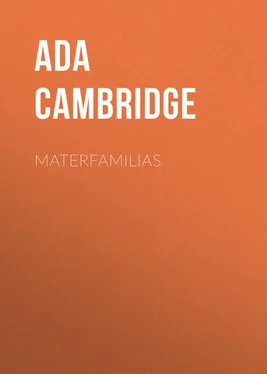Ada Cambridge - Materfamilias
Здесь есть возможность читать онлайн «Ada Cambridge - Materfamilias» — ознакомительный отрывок электронной книги совершенно бесплатно, а после прочтения отрывка купить полную версию. В некоторых случаях можно слушать аудио, скачать через торрент в формате fb2 и присутствует краткое содержание. Жанр: foreign_antique, foreign_prose, на английском языке. Описание произведения, (предисловие) а так же отзывы посетителей доступны на портале библиотеки ЛибКат.
- Название:Materfamilias
- Автор:
- Жанр:
- Год:неизвестен
- ISBN:нет данных
- Рейтинг книги:5 / 5. Голосов: 1
-
Избранное:Добавить в избранное
- Отзывы:
-
Ваша оценка:
- 100
- 1
- 2
- 3
- 4
- 5
Materfamilias: краткое содержание, описание и аннотация
Предлагаем к чтению аннотацию, описание, краткое содержание или предисловие (зависит от того, что написал сам автор книги «Materfamilias»). Если вы не нашли необходимую информацию о книге — напишите в комментариях, мы постараемся отыскать её.
Materfamilias — читать онлайн ознакомительный отрывок
Ниже представлен текст книги, разбитый по страницам. Система сохранения места последней прочитанной страницы, позволяет с удобством читать онлайн бесплатно книгу «Materfamilias», без необходимости каждый раз заново искать на чём Вы остановились. Поставьте закладку, и сможете в любой момент перейти на страницу, на которой закончили чтение.
Интервал:
Закладка:
Ada Cambridge
Materfamilias
CHAPTER I
THE BEGINNING OF IT ALL
My father in England married a second time when I was about eighteen. She was my governess.
Mother herself had engaged her, and I believe had asked, when dying, that she would remain to take care of us; and I don't say that she was not a good woman. She had been nearly five years in the house, and we had the habit of looking to her for advice in all family concerns; and certainly she took great pains with my education. But of course I was not going to stand seeing her put in mother's place. I told father so. I said to him, kindly, but firmly: "Father, you will have to choose between us. There will not be room under this roof for both."
He chose her. Consequently I left my home, though they both tried hard to prevent it, and to reconcile me to their new arrangements. I will say that for them. In fact, my father, pleading legal rights, forbade me to go, except for some temporary visiting. I went on the understanding that I was to return in a couple of months or so. But I was resolved not to return, and I never did. While staying with my uncle, a medical man, I privately married his assistant – one (if I may say so) of a miscellaneous assortment of admirers. I am afraid I encouraged him to propose an elopement; I certainly hastened its accomplishment. Then after all our plottings and stratagems, when at last I had the ring on my finger, I wrote to inform father of what he and Miss Coleman had driven me to. Poor old father! It was a tremendous blow to him. But I don't know why he should have made such a fuss about it, seeing that he had done the same – practically the same – himself.
It was a greater disaster to me than to him, or to anybody – even to my husband, who almost from the first regarded me as a millstone about his neck; for he could go away and enjoy himself when he liked, forgetting that I existed. Indeed, it was a horrible catastrophe. When my own children are so anxious to get married while they are still but children, and think it so cruel of me to thwart them, I wish I could tell them what I went through at their age! But I don't mention it. I promised Tom I never would.
At twenty I was teaching for a living – I, who had been so petted and coddled, hardly allowed to do a hand's turn for myself! My husband was travelling about the world as a ship's doctor. Father wanted me to come home, but I was too proud for that. Besides, I would not go where I had to hear Edward insulted. After all, he was my husband, and our matrimonial troubles were entirely our own concern. Not from him, either, would I accept anything after I was able to earn for myself. I taught at a school for thirty pounds a year, and managed to make that do. It was a wretched life.
I was barely of age when the news came that Edward had caught fever somewhere and been left in a Melbourne hospital by his ship, which was returning without him. At once I made up my mind that it was my duty as a wife to go to him. He had no friends in Australia, and not much money; it was pathetic to think of him alone and helpless amongst utter strangers; and I thought that if I did this for him he would remember it afterwards, and be kind to me, and help me to make our married life a little more like other people's. In those days there was no cable across the world, and mails but once a month; so that when I started I was altogether in the dark as to what I was going to. The first news of his illness – with no particulars, except that it was fever – was all I ever had.
I would not ask my father for money. Indeed, he would have frustrated my purpose altogether had he known of it in time. I went to my old godmother, Aunt Kate, who was very rich and fond of me, and begged the loan of fifty pounds, not telling her what I wanted it for. She gave the money outright, with another fifty added to it; so that I had plenty to cover the cost of a comfortable voyage. I determined, however, to save on the voyage all I could, that I might have something in my pocket on landing, when funds would be sorely needed. To which end I engaged my berth in the humblest passenger-boat available – Tom's little Racer, of ever-beloved memory. They told me at the office that she was better than her name – faster than many that were twice her size. I was young and silly enough to believe them, and also to forget that by the time I reached Australia Edward's illness would have long been a thing of the past, and he perhaps back in England or well on his way thither.
If the Racer was one of the smallest ships in the Australian trade, her master, Thomas Braye, must have been one of the youngest captains. At that time he was under thirty, though he did not look it, being a big man, quiet and grave in manner, deeply sensible of his professional responsibilities. I remember thinking him rather rough and decidedly plain when I saw him first; but he was gentleness and gentlemanliness incarnate, and I never afterwards thought of his appearance except to note the physical inadequacy of other men beside him.
He has told me since that his first feeling on seeing me was one of strong annoyance. Though a married woman and going out to my husband, I was but a young girl in fact – far too young and far too pretty (though I say it) to be travelling as I was, without an escort. It unfortunately happened that I was the only lady in the saloon, and that the ship was too small to have a stewardess. Three wives of artisans herded with their husbands and children in the black hole they called the steerage, and one of them was summoned aft as soon as we were in the river to keep me company. But as the others were disagreeable about it, and she was a coarse and dirty creature, I myself begged Captain Braye to send her back again. Poor Tom! By the way, I did not call him Tom then, of course; I did not even know his Christian name. He says he never undertook a job so unwillingly as he did that job of taking care of me. How absurd it seems – now!
We sailed in late autumn, in the twilight of the afternoon. I remember the look of the Thames as we were towed down – the low, cold sky, the slate-coloured mist, with mere shadows of shores and ships just looming through it. Nothing could have been more dreary. And yet I enjoyed it. The feeling that I was free of that horrible schoolroom, and that still more horrible lodging-house, where I cooked meals over an etna on a painted washstand, and ate them as I sat on a straw-stuffed bed – the prospect of long rest from the squalid scramble that life had become, from all-day work that had tired me to death – oh, no one can understand what luxury that was! Besides, I had hopes of the future, based on Edward's convalescence and reform, to buoy me up. And then I loved the sea. People are born to love it, or not to love it; it is a thing innate, like genius, never to be acquired, and never to be lost, under any circumstances. When the Channel opened out, and the long swell began to lift and roll, I knew that I was in my native element, though a dweller inland from birth up to this moment. The feel of the buoyant deck and of the pure salt wind was like wings to soul and body.
But I had to pay my footing first. It came upon me suddenly, in the midst of my raptures, and I staggered below, and cast myself, dressed as I was, upon my bunk. Never, never had I felt so utterly forsaken! When ill before, with my little, trivial complaints, Miss Coleman had waited on me hand and foot – everybody had coddled me; now I was overwhelmed in unspeakable agonies, and nobody cared. It is true that – though I would not have her – the steerage woman came in the middle of the night; and once I roused from a merciful snatch of sleep to find my bracket lamp alight where all had been darkness. These things indicated that some one was concerned about me – Tom, of course – but I did not realize it then. I was alone in my misery, alone in the wide world, of no consequence even to my own husband; and I wished I was dead.
Читать дальшеИнтервал:
Закладка:
Похожие книги на «Materfamilias»
Представляем Вашему вниманию похожие книги на «Materfamilias» списком для выбора. Мы отобрали схожую по названию и смыслу литературу в надежде предоставить читателям больше вариантов отыскать новые, интересные, ещё непрочитанные произведения.
Обсуждение, отзывы о книге «Materfamilias» и просто собственные мнения читателей. Оставьте ваши комментарии, напишите, что Вы думаете о произведении, его смысле или главных героях. Укажите что конкретно понравилось, а что нет, и почему Вы так считаете.





![Уильям Шекспир - The Works of William Shakespeare [Cambridge Edition] [Vol. 1 of 9]](/books/746589/uilyam-shekspir-the-works-of-william-shakespeare-c-thumb.webp)






